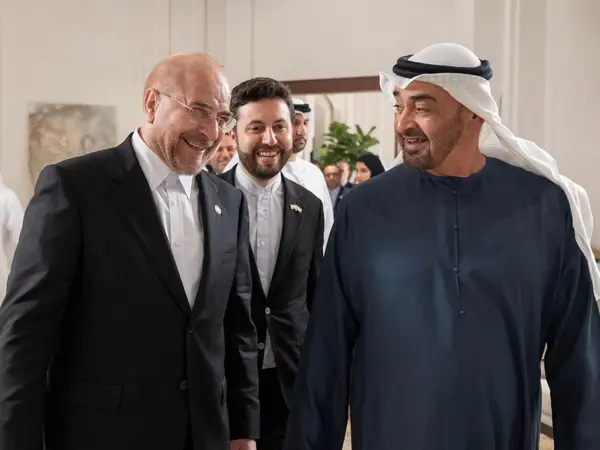Iran should make a more concerted effort to circumvent sanctions, Speaker of Parliament, Mohammad Bagher Ghalibaf, told a gathering in Tehran on Friday.
Ghalibaf, a former senior commander of the Revolutionary Guard and a politician close to the family of Iran’s ruler Ali Khamenei, addressed the issue while speaking on Friday to a group of Iranian businessmen while visiting the United Arab Emirates. He criticized lack of coordination “between the government and the private sector to neutralize sanctions.”
Ghalibaf told the Iranian businessmen, “Sanctions are a political matter that certainly needs to be pursued in the field of foreign policy, and actions are being taken in this regard. Another issue is neutralizing sanctions, which both the public and private sectors must reach a common understanding on.”
While Iranian officials have been demanding the lifting of US economic sanctions, they have also consistently underlined the necessity to circumvent the restrictions. In October 2018, Khamenei said Iran will “slap” the United States by defeating US sanctions on Iran’s oil exports and international banking imposed a few months earlier by the Trump administration, after it withdrew from the Obama-era JCPOA nuclear deal. “With the grace of God, we will defeat sanctions. And the defeat of sanctions is the defeat of America,” Khamenei said.
US sanctions held steady during the Trump years, and Iran’s oil exports dropped to as low as 250,000 barrels a day compared with more than 2 million before the sanctions, but Tehran managed to gradually increase shipments after President Joe Biden won the 2020 election.
Ghalibaf stressed that the Iranian government should coordinate better with private firms “outside Iran” to bust the sanctions, a reference to the significant role Iranian expatriate businessmen can play, especially in the United Arab Emirates.
Although the Biden administration has periodically sanctioned individuals and firms secretly helping Iran in its illicit trade activities, the pressure apparently has not been enough, driving Tehran’s oil exports to 1.8 million barrels per day in mid-2023. Companies in the region, including in the UAE have acted as middlemen in arranging illicit Iranian oil shipments to Asia and even laundering the money back to Tehran.
In August 2022 for example, the United States imposed sanctions on Chinese and other firms it said helped to sell tens of millions of dollars in Iranian oil and petrochemical products to East Asia.
But recently, the Biden administration agreed to allow the release of a whopping $8.7 billion in frozen Iranian funds in exchange for freeing five US hostages held in Iran. The move not only brought a windfall for Tehran but according to critics could endanger more Americans in the future.
However, the Speaker of Iran’s parliament urged expatriate businessmen to attempt to circumvent US sanctions, which in essence could jeopardize the interests of the host country, in this case the UAE.
“There are ways to neutralize sanctions,” he said. “Unfortunately, the public and private sectors of the country have not been able to coordinate themselves to neutralize sanctions, and as a result, this coordination should also take place outside the country. Therefore, this coordination needs to be closely, deliberately, intelligently, swiftly, and precisely carried out. There is no insurmountable task in this field, and the only issue is the lack of coordination and organization between the private and public sectors.”
Ghalibaf went further and called for more efforts involving the UAE to circumvent the sanctions. “Unfortunately…In this regard, one of the areas that has received less attention is our communication with neighboring countries, especially the United Arab Emirates, which has historically been one of the pillars of our trade in both the public and private sectors.”





















